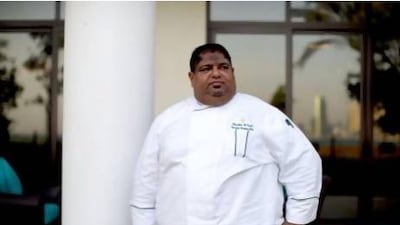“As a young boy when I was about 13, at night over Eid, my friends and I would tear off chunks of warm ouzi from our houses in Hatta. We would sit together and taste each other’s stolen ouzi and compare. Only for a few minutes and we’d agree whose is the best,” reminisces Musabbeh Al Kaabi, 37, the UAE’s first Emirati chef. He swapped his military uniform for chef’s whites 12 years ago and is now executive Oriental chef at Jumeirah Zabeel Saray in Dubai.
The forthcoming Eid Al Fitr celebration marks the first day after the Holy Month, where Muslim families around the world gather together over lunch to indulge in traditional, wholesome fare, like the ouzi prevalent here in the UAE.
The local ouzi is usually cooked using goat or sheep, but occasionally even cows or camels from the local farms are slaughtered if the meat is tender enough. The herbs and spices for the ouzi marinade vary from household to household – and are sometimes a closely guarded secret. Al Kaabi infuses his recipe with two distinctively flavoured herbs from the Hatta mountains that grow in his own farm: shooa and zam.
“We have an oven in the ground. We put wood, burn it to charcoal, wrap the animal tightly in palm leaves and seal the hole well; otherwise any air leakage and the meat will burn. We let it cook for anything from six to 14 hours. The hole is so big it can take up to four cows or 12 sheep!”
Local women start discussing their Eid menus about a week in advance, assigning dishes and always making enough for the extended family. The dishes are taken to one house, where the men sit together and eat, while the women play with the children.
“My sister, my auntie and my wife do the cooking. I am the marination guy and the taster!”
Over Eid, local families make the rounds of relatives’ houses, dropping in for coffee, dates and fruit in the morning after prayers and once again in the afternoon. Lunch is the main celebratory meal on both the first and second day of Eid, but sometimes, like with Al Kaabi, dinner is also a grand occasion as his sister makes the long journey to Hatta from Abu Dhabi.
Ouzi aside, chicken muchboos is another signature Eid dish; chicken thighs, tomatoes and onions pan-fried with garlic, coriander, cinnamon, bay leaves, cloves, ginger and dried lemons – all mixed with basmati rice. Kingfish biryani, another speciality, is based on the renowned Indian biryani, but the local spices are different and milder. Vegetarian dishes are also abundant – with salona, a tomato, potato and baby marrow stew, being the most popular. Luqaimat – round, sweet dough balls dipped in date syrup – are highly prized by children. Al Kaabi’s son relishes them with scoops of ice cream and chocolate sauce. Children also look forward to the long-standing “eidia” tradition, where family members give kids Dh5-10 to buy ice cream, chocolate or sweets.
Meanwhile Shaikha Al Ali, the creative director of When Shaikha Cooks (www.whenshaikhacooks.com), says: “Over Eid we are very traditional and serve popular dishes to family and guests that come to our house throughout the day – ouzi, harees, balaleet, khameer, luqaimat, ghuraiba and maamoul.”
In many cases, when cooking for two to three families or more, the home kitchen is not large enough so dishes are ordered through a “public kitchen”, where ingredients such as lamb, rice or the more unusual mountain spices are dropped off for these caterers to use.
Luckily, sourcing of ingredients is easy across all the Emirates today, but more than two decades ago, when Al Kaabi was growing up in Hatta, there was no local market. “My father would burn wood to make charcoal. He would travel to Dubai with his camel in three days, and would sell the charcoal and he would then buy sugar and flour.”
Chef Musabbeh's Emirati dishes can be sampled at Jumeirah Zabeel Saray's Imperium restaurant across the three days of Eid. Call 04 453 0444, email jzsrestaurants@jumeirah.com or visit www.jumeirah.com
Where to dine on Emirati cuisine in the UAE?
Abu Dhabi
Mezlai at Emirates Palace, an Emirati fine-dining restaurant helmed by an Emirati chef.
Despite the name, Saudi Kitchen in Khalidiya serves Emirati dishes. Call 02 665 5355 for the exact location.
Dubai
The Sheikh Mohammed Centre for Cultural Understanding hosts weekly Emirati breakfasts, brunches, lunches and dinners in a traditional wind tower house in Bastakiya, Bur Dubai. Visit www.cultures.ae for the schedule.
Al Fanar is a restaurant dedicated to Emirati cuisine at Dubai Festival City.
Emirati n More at the Cassells hotel in Barsha – choose to sit at a table or on traditional majlis seating.
Al Makan restaurant, in Madinat Jumeirah’s souq, dishes up Emirati treats from a Middle Eastern a la carte menu.
Al Dawaar, the revolving restaurant at the Hyatt Regency Dubai, hosts an Emirati lunch buffet every Friday.
Klayya Bakery, an authentic Emirati bakery in Al Barsha Mall.
Follow us
And follow us on Facebook for discussions, entertainment, reviews, wellness and news.
Samantha Wood is the founder of impartial restaurant review blog www.foodiva.net

